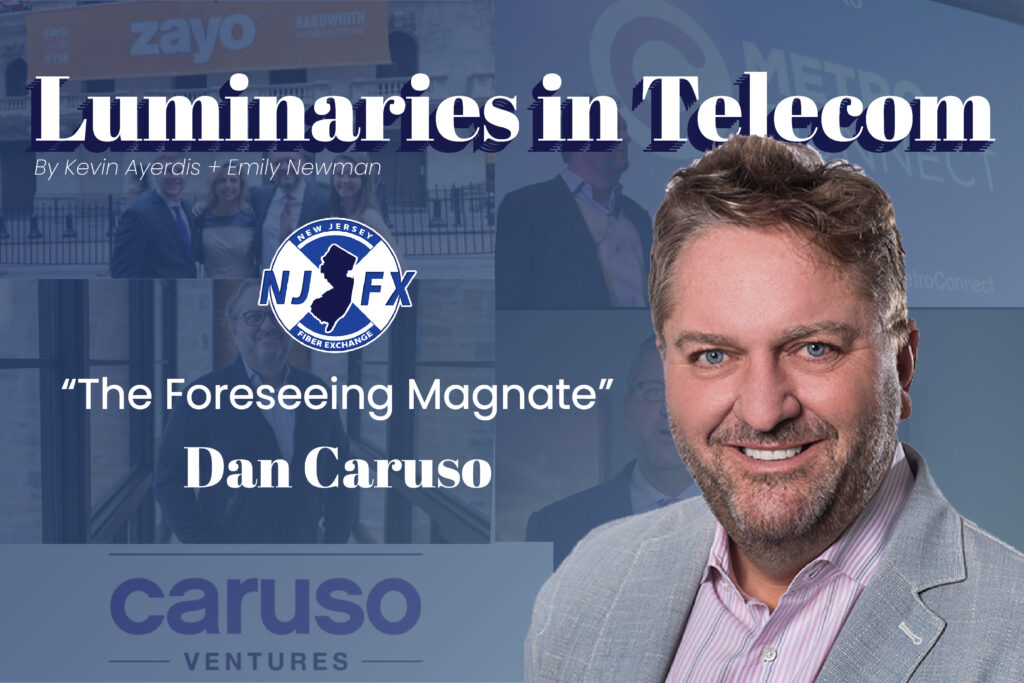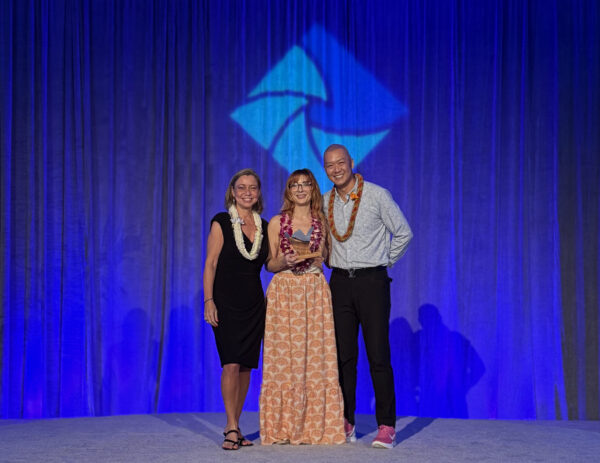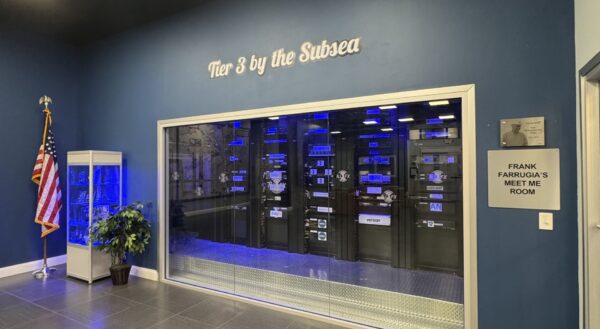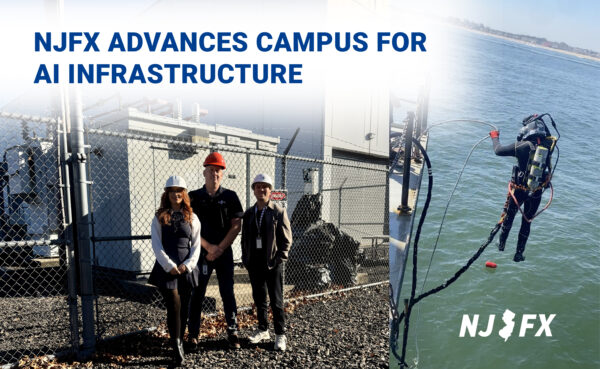
All Hazard Preparation, Safety, Recovery Training (Gray Zone)
New Jersey experienced an uptick in wildfire incidents during the dry season of 2025, the communications sector faced significant challenges.
Kevin Ayerdis + Emily Newman
September 18, 2023

Known for his measured approach and keen understanding of market dynamics, Dan Caruso has consistently demonstrated a knack for savvy foresight into the ebb and flow of trade. After laying the foundation of success in his initial ventures, he is now diversifying his portfolio by investing and collaborating with an array of entrepreneurs across various industries. With an eye on the future, Caruso is exploring cutting-edge domains such as space tech, quantum computing and sensing, and artificial intelligence. Unlike most professionals who set 5, 10, or perhaps 20-year objectives, this visionary is thinking in terms of a “100-year plan,” showcasing the grand scale of his ambition. Known as an instrumental leader in companies like Level 3 Communications, ICG, and, most notably, as the Co-founder and CEO of Zayo Group, Dan Caruso is making a significant mark on the industry. As he charts a course toward a future rich with potential, he has aptly earned the moniker “The Foreseeing Magnate.” Discover more about the visionary charting a path towards an innovative and expansive future: Mr. Dan Caruso.
Hailing from the south suburbs of Chicago, Dan Caruso was no stranger to skepticism and discouragement. From an early age, he encountered voices, including a guidance counselor, who plainly told him, “You’d never be able to do it.” As a young, aspiring engineering student these words resonated deeply with Caruso, especially when he received rejection letters from all the schools to which he had applied. He vividly recalls this defining moment, which ignited a fire within him to take education seriously. Undeterred, he enrolled in the liberal arts colleges, with the intention of transferring into an engineering program—a plan that advisors tried to dissuade him from. Caruso, however, was resolute; he excelled in math, physics, and chemistry, earning top marks that allowed him to transfer into his desired engineering program. Although it took him five years to complete his engineering studies, much to his parents’ chagrin, he remained committed.
While still in school, Caruso became keenly aware of significant developments in the broader world, specifically the landmark deregulation of the Bell Systems monopoly. This event, along with other emerging trends in telecommunications, caught his attention. After completing his B.S., Caruso found himself irresistibly drawn to the seismic shifts occurring within the telecom industry. He launched his career at the Illinois Bell subsidiary of Ameritech and earned his MBA from the University of Chicago at night. He secured his first significant role at Chicago Fiber Optics, which later became MFS Communications Company, marking what he now recognizes as his inaugural experience with large-scale, growth-oriented companies.
Reflecting on those formative years in the telecom industry and the sweeping changes of that era, Caruso observed, “The expansion of fiber optics, the start of mobile, this idea that data was going to be bigger than voice, and deregulation made the telecom industry poised for revolutionary change. The Bell system had broken up and competition was on the verge of being introduced. MFS was beginning its scale-up journey when I joined, and I was fortunate to ride that hockey stick curve of explosive growth.” Dan was wired to be on the side of the newly emerging competitors rather than the side of the traditional telecom monopoly, Caruso played an integral role at Chicago Fiber Optics, which underwent a series of evolutions, eventually becoming Metropolitan Fiber Systems and then MFS Communications Co. In this vibrant, rapidly evolving environment, Caruso carved a path that would lead him to become a transformative figure in the world of telecommunications.
After several years, MFS was sold to WorldCom, providing Caruso with invaluable insights. “This merger helped me understand what it means to be part of any venture,” he reflects. “Whether it’s a successful startup, scaling up, an IPO, or a roll-up — all of those things happened for me during a 5-to-6-year period, including building relationships that paved the way for the next stage of my career.”
Caruso was among the select few whom WorldCom was keen to retain. He found himself in a position just one step removed from Bernie Ebbers and Scott Sullivan, both of whom at the time were seen as Wall Street’s “wonder boys” — the most acclaimed CEO and CFO of their time, respectively.
Regarding his time working alongside these high-profile executives, Caruso shares: “I was fortunate to have enough insight and business sense to realize something was amiss. That instinct led me to leave WorldCom earlier than I had originally planned. In doing so, I left unvested stock options behind to reunite with the quickly regathering team that had originally founded MFS.”
With this seasoned team coming back together and choosing to carve their own niche, they saw potential in Colorado. “We founded and launched Level 3,” Caruso says, “but it wasn’t easy to walk away from that equity. When I left, the equity doubled in value and I felt pretty foolish… Thankfully, I listened to my gut.”
His instincts proved wise. Over the next couple of years, WorldCom’s accounting fraud was revealed, the result of which led to Ebbers and Sullivan eventually being sentenced to prison. WorldCom went bankrupt and the equity Caruso had walked away from plummeted to nothing. “Let me tell you,” Caruso adds with a relieved smile, “I didn’t feel so foolish anymore!”
Taking Lead
In the late nineties, as the “fiber boom” and “dot com” era were entering full swing, Level 3 Communications began to take shape, marking new territory for Dan. Fresh from his experience at WorldCom, and with hard-won lessons in trusting his instincts, Caruso and Level 3 other founders assembled a trusted and experienced team. They entered the telecommunications industry ready to take on the competition, starting by building their own networks and collaborating with local inner-city and metro fiber groups.
For a time, they rode the upward curve of demand and, like many others, endured the downturn during the 2001-02 cycle — a period that Caruso feels has echoes in current events. Amid the boom, Level 3 faced numerous challenges, including a brush with bankruptcy. “We were one of the very few who avoided bankruptcy,” Caruso recalls. “We scraped off the top of the trees and picked up momentum at the end. That was probably one of the most important parts of my career. Between 2002 and 2004, we really had to bear down and figure out how to get the company back to a solid spot. We built some strong relationships in the process, all while fighting through the trenches and emerging on the other side with a viable company.” By the end of Caruso’s tenure with the group, Level 3 had successfully navigated through the telecom meltdown.
Having narrowly avoided bankruptcy with Level 3, Caruso would face financial turbulence again at ICG, but this time as CEO. Contemplating his next move after Level 3, Dan found his next opportunity at a company on the brink of a particularly rough bankruptcy – ICG. “I was lucky enough to find a company where nobody else wanted to be CEO,” Caruso chuckles. With strong relationships established with reputable investors Columbia Capital and MC Ventures, led by industry veterans like John Siegel and Jim Fleming, Caruso and his team saw an opportunity to avoid bankruptcy altogether by buying ICG’s public stock and reworking their debt obligations.
“In closing the deal,” Caruso explains, “we took a company that was thought to be crashing face first into a Chapter 7 bankruptcy and bought it for almost nothing. We created a lot of value and ultimately exited by selling to multiple different companies, including Level 3. We invested $8.7 million and took out close to $250 million when the dust settled. It was a home run return when investors desperately needed it, as they were coming out of the telecom meltdown era. It certainly propelled us forward to come up with a thesis that would culminate in the formation of Zayo.”
This significant reversal—turning a company deep in the red into an overwhelming success—provided the financial backing to form Zayo Group. Under Caruso’s leadership at Zayo, significant and numerous acquisitions, such as AboveNet, 360networks, Spread Networks, and AFS Networks, expanded the company’s fiber network across the U.S. and steadily into Europe.
When asked what he, as the “Strategist” at the helm, considers the key factors behind Zayo’s success and what helped navigate him and his team through the challenges of such rapid expansion, Caruso reflects on the lessons of his past, the trust in his team, and an unwavering belief in the strategy they crafted together.
Caruso and his team identified an overlooked opportunity: the underestimated value of fiber. At that time, many investors viewed fiber as a toxic asset due to losses in the early 2000s. Caruso, however, saw it differently. He believed in focusing on the core infrastructure of fiber—selling dark fiber and bandwidth to large users—while avoiding higher-layer services like VoIP.
Caruso’s team noticed numerous “fiber orphans”—fiber properties that had survived the meltdown, and operated regional networks but were largely ignored by investors. The team’s strategy was to consolidate these underutilized assets under one strategic umbrella.
Many of these fiber properties had ended up with “accidental owners”—people or entities that had never intended to own such assets. Caruso’s direct approach—calling these owners and plainly offering to buy—proved effective. While these owners achieved good exits for themselves, Caruso and his team steadily built a healthy, valuable multi-geography fiber platform.
By staying focused on this “bandwidth infrastructure” approach, they built a platform reminiscent of what Level 3 had originally intended to be, before the industry trend shifted towards managed services.
“We were able to roll up these assets before most institutional investors caught on to what was happening,” Caruso explains. “We started in 2007 and accelerated while others were navigating the 2008-2009 Great Recession. By 2012, other investors including Growth and Infrastructure Equity caught on, ‘Hey, maybe we should be consolidating fiber companies!'”
In summary, Caruso’s foresight and strategy—spotting and consolidating undervalued fiber assets under a coherent, focused bandwidth infrastructure approach—reshaped the landscape of the fiber industry, turning overlooked opportunities into a powerful network.
With a strategically constructed platform already in place, Caruso and his team found themselves on a well-timed and directed path toward their next significant venture: the acquisition of AboveNet. This key merger, Caruso recalls, elevated their relevance extensively throughout the industry, transforming them into a major player in the field.
A crucial step in this journey was navigating through the Initial Public Offering (IPO) process. Caruso notes that this step was instrumental in igniting the interest of potential investors. It generated what he remembers as a bit of “over-enthusiasm” for what they were aiming to accomplish. This buzz was a double-edged sword: while it brought a heightened interest to Zayo, it also resulted in other investors entering Bandwidth Infrastructure driving up the price of acquisitions and driving down pricing for organic revenue initiatives such as Fiber to the Tower.
“Entering the IPO process was a pivotal moment for us,” Caruso reflects. “It certainly brought a level of visibility and interest that we hadn’t experienced before. Suddenly, we were on the radar of a broader range of investors. But with this increased attention and investment came heightened expectations.”
Caruso candidly recalls how this burst of attention, while validating and energizing, also brought its own set of challenges. “It made what was relatively easy to execute in the early 2010s a lot harder to execute later on,” he explains. The influx of private equity capital created fierce competition for acquisitions and customer projects.
These were growing pains, as Caruso calls them—part of the learning curve associated with ascending through the ranks of a competitive and rapidly evolving space. Yet, throughout these challenges, Caruso and his team remained resilient and adaptable, continually learning, and refining strategies as they solidified their place as leaders in the industry.
The acquisitions of AboveNet, 360Networks, Electric Lightwave, American Fiber Systems, Spread Networks, and Allstream were watershed moments for Caruso and his team, substantially increasing their relevance in the industry. The IPO process, while generating significant interest and investment, also introduced new complexities and expectations that the team had to navigate as part of their ascension in the telecommunications space.
When asked about the importance of building towards a common goal and cultivating Zayo’s culture and ethics around transparency and open communication, Caruso emphasizes that it’s about helping various teams understand their sense of purpose. For him, this goes beyond just the company’s success—it’s about the profound impact that success has on the people involved and the ripple effects it creates.
“Zayo invested $1.1 billion of equity throughout its life,” Caruso recalls. “When we sold Zayo for $14.3 billion, the equity was worth eight and a half billion! Turning $1.1 into $8.5 billion was accomplished by an extraordinarily capable, entrepreneurial, and driven team executing a focused Bandwidth Infrastructure strategy. We delivered outstanding results for our demanding customers, created tremendous value for our investors, and enabled an exciting and lucrative journey for the broad Zayo team. This harmonious blend of success and value is rare, and we were fortunate to live that experience together.”
Caruso attributes this success to the understanding of scale and meticulous buildup of fiber and internet infrastructure, merger and acquisition competency, a culture around creating value for our stakeholders, and the strong relationships they nurtured along the way. “We did it together,” he stresses.
Reflecting on his own career journey, Caruso notes the continuity and depth of relationships he has maintained over the years. “There are people I’ve worked with across three, four, five different companies who joined the Zayo team,” he observes. “Many of them came from MFS, Level 3, ICG, and even my Ameritech days. Without building upon these core relationships, the journey I’ve had would not have been possible.”
For Caruso, the success of Zayo is deeply intertwined with purpose, strong relationships, and an unwavering team commitment. His leadership focused on fostering a culture that values open communication, a shared sense of purpose, and the nurturing of enduring professional relationships that, in his experience, have been instrumental in achieving extraordinary results.
Technology Leaps to Success
To Caruso, the future is not just bright; it’s transformative, driven by rapidly evolving technologies like Space Technology, Artificial Intelligence (AI), and Quantum Computing and Sensing.
“People have always been afraid of new technologies,” Caruso observes, drawing a line from television sets that spooked earlier generations to the unease that some feel about the internet and AI today. But to him, fear is no reason to turn back. “AI is the way forward!” he insists.
Caruso envisions a world where AI, combined with emerging technologies like quantum computing and sensing, will redefine what’s possible. “We haven’t even scratched the surface of what data will look like 10 years from now, 50 years from now,” he explains. He believes that we are at the dawn of a new era where technology will rapidly start to approach and even surpass human capabilities.
In Caruso’s view, the true power of AI lies in its ability to process vast amounts of data quickly and generate sensible results. As AI becomes more sophisticated, the volume of data it can handle, and thus produce, will proliferate dramatically.
He shares an example from the world of robotics, highlighting a company called AMP Robotics that is working on automated recycling systems. These systems need to process a multitude of data types in real-time — from visual data that helps identify materials on a conveyor belt, to weight data that helps sort these materials effectively. As these systems process more data and become more efficient, the demand for stable, reliable networks to handle this data will soar.
Caruso sees these technological leaps as integral to the telecom industry’s future. In a world increasingly dependent on data, the need for robust, reliable networks to store and access this data in real-time will be paramount.
When asked what defines success for him and what drives him to continually pursue new avenues, Caruso’s formula seems rooted in his love for innovation and his belief in the transformative potential of technology. For him, success is not just about building profitable companies; it is about fostering teams that can envision and shape the future, leveraging technology to solve complex problems and improving the world.
In today’s rapidly evolving world, the gap between ambitious individuals and those less engaged is widening, creating unprecedented opportunities for those with genuine ambition. This is particularly evident in the current economic cycle, which, despite its challenges, has sparked a wave of innovation across various fields including fintech, space tech, and medicine. Caruso explained, “one primary example of these new tools for ambitious individuals is artificial intelligence (AI). AI is poised to be as transformative as the internet, revolutionizing productivity across all sectors. As these tools become more accessible, those who are proactive and engaged in leveraging technologies like AI find themselves at a distinct advantage. They can be remarkably more productive than their peers, effectively navigating the vast range of opportunities that our modern world offers.”
However, this also raises concerns about growing inequalities, as those who remain disengaged risk falling irretrievably behind.
“Individuals who are not actively engaged in their work or personal development may find it increasingly difficult to catch up with their more motivated peers. One of the significant risks facing young people today, especially as they emerge from the Covid era, is the adoption of less diligent work habits. In the current environment, finding a job has been easier, and flexible working environments have become more commonplace. It is essential for individuals to recognize the importance of developing their skills and expertise, thereby ensuring they are positioned to thrive in this dynamic environment.”
Dan Caruso is focused on building a legacy through a multi-generational family plan, centered around a single-family office environment. He is investing time in developing skills and capabilities in trust management and staying current with technology trends, which are integral to the family’s culture, values, and purpose. The goal is to establish a 100-year plan that considers the future for not just his life but for the next 3-4 generations as well. This long-term vision is meticulously mapped out, considering the needs and opportunities for family members who will come of age a century from now. Beyond his family-centric objectives, Caruso remains active in the entrepreneurial community, especially in Colorado. He is an investor in a diverse range of companies, including space tech, quantum, and language translation services, reflecting his love for engaging with groundbreaking technologies and innovative entrepreneurs.
—-
Thank you, Dan Caruso, for enlightening us and the telecoms community with your insights. While we’ve touched on a fraction of your journey as “The Foreseeing Magnate”, there’s much more to explore in the future. As this month’s Luminaries in Telecom feature wraps up, we encourage readers to share their takeaways from Caruso’s strategies and generational planning in the comments. Have suggestions for other telecom leaders to feature? Reach out to [email protected]. Until next time, thanks for joining us!

New Jersey experienced an uptick in wildfire incidents during the dry season of 2025, the communications sector faced significant challenges.

New Jersey experienced an uptick in wildfire incidents during the dry season of 2025, the communications sector faced significant challenges.

New Jersey experienced an uptick in wildfire incidents during the dry season of 2025, the communications sector faced significant challenges.

NJFX today announced the completion of a comprehensive Basis of Design for a new 10MW high-density AI data hall, delivering an expected 1.25 PUE and 8MW of usable IT load.

NJFX today announced the completion of a comprehensive Basis of Design for a new 10MW high-density AI data hall, delivering an expected 1.25 PUE and 8MW of usable IT load.

New Jersey experienced an uptick in wildfire incidents during the dry season of 2025, the communications sector faced significant challenges.
